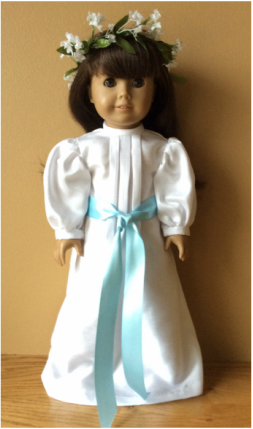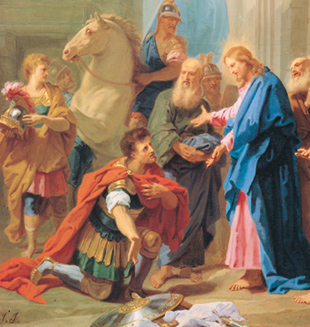We answer : The Catholic Church is apostolic, because her chief pastor, the pope, is the lawful successor of St. Peter, and the bishops are the lawful successors of the other apostles,from whom they have their doctrine, their orders, and their mission, through an unbroken succession of bishops.
The Catholic Church can show precisely how she obtained possession of the divine authority of the apostles. The Roman Pontiff, Pius IX, can name the two hundred and fifty-three popes who, without a break, handed down the authority of St. Peter, the head of the apostles, even to himself. He can tell the day and hour of his election and consecration, which are consigned to imperishable monuments. Every bishop of the Catholic Church can also show the authentic titles which prove the transmission of the apostolic authority from the pontiff, who founded his Church, down to himself, the validity of his ordination, and the legitimate character of his mission. Every priest receives his authority from his bishop. Thus there is not a break in those glorious lines of bishops, which each episcopal see, and above all sees, that of Peter, can show alike to friend and foe. Here nothing is arbitrary, nothing uncertain. The apostolic ministry is perpetuated, under the presidency of the head of the apostles, with the perpetual presence and assistance of Him who promised to be with his own, even to the end of the world. Thus the authority of the minister of our altars does not depend on the power of any temporal monarch, nor on the people ; it depends solely on the head and chief pastor in the apostolical hierarchy. What noble independence this ! It is the security of the faithful, and constitutes both the greatness of the Church, and the dignity of her pastors.
In the beginning of the thirteenth century the pope sent ambassadors to the famous Tartar monarch, Gengis Khan. The Tartars asked the ambassadors, "Who is the pope ? Is he not an old man at least five hundred years of age ?" They might have said twelve hundred, and they would have been right ; for, as Pius IX has said so truly, "Simon may die, but Peter lives forever" and Peter will live until time shall have ended its course. Pius IX is to us Peter, for each pontiff, as he comes, reigns upon Peter's throne, speaks with his voice, binds and looses with his hands, opens and closes the kingdom with the keys which Peter once took from the pierced hands of his divine Master ; and he will hold those keys of life and death till the number of the elect is filled, and the last of the redeemed enters his Father's house.
The Church taught and governed in our days by the pope and bishops, differs not in its essential character from the Church taught and governed by Peter and the apostles. Let us see how Peter exercises the authority conferred on him, and, through him, upon all his successors, by Jesus Christ. After the resurrection of our Saviour, who appeared to Peter first of all the apostles, he is the first to proclaim that resurrection to all the people, and he confirms the truth of his testimony by a miracle. ( Acts ii, 14 and, iii, 15.) After the ascension of our Lord, Peter assembled the apostles and some disciples in the upper chamber, and addressed them thus, "The Scripture must needs be fulfilled" which foretells the defection of Judas, and his place being taken by another. We, therefore, must choose one from among us, who has been a witness to the miracles and resurrection of the Son of God, to take his place. (Acts i, 16.) Is the Gospel to be preached to the Gentiles ? It is Peter to whom the solution of the
difficulty is revealed it is he who decides, "all holding their peace, and giving glory to God." (Acts iii, 18.) Peter first received the Gentiles into the Church ( Acts x ), after having been the first to introduce the Jews into her sacred fold. At a later period the question of circumcision and the ceremonies of the law came up. Peter at once rose up, and explained the common faith. All listened in silence. A decree was made in which the faith on this point was determined forever. Peter visited the Christians of Joppe, Lydda, Galilee, Pontus, Galatia, Cappadocia, Asia, Bithynia, etc. ( Acts ix.) Everywhere he founded new congregations of Christians, and visited them all in, his office of Supreme Pastor. From Jerusalem he went to Antioch, from Antioch to Rome, where he combated the heresy of Simon the Magician, and finally sealed his glorious apostleship by dying a martyr's death.
As the lawful successor of the Prince of the Apostles, the pope decides, without appeal, matters of faith and morals, convokes general councils, presides over and confirms them, founds churches, visits them in person, or by his delegates, appoints bishops, confirms them in the faith, and acts in all as the Supreme Head and Pastor of the Catholic Church. Peter took possession, for himself and his successors, of all the prerogatives and duties of the Sovereign Pontificate. Now let us see how the apostles exercise the authority conferred on them by Christ, From the Acts of the Apostles we learn that they teach and preach the Gospel, they baptize and impose hands, that is, give confirmation,- they found churches, and give them pastors ; they choose one to succeed Judas; in the Council of Jerusalem, they regulate whatever concerns faith and discipline, saying, "It has seemed good to the Holy Ghost and to us" (Acts xv, 82) ; they resolve difficulties, and repress scandals that arise, and, if necessary, they excommunicate him who deserves to be cut off from the communion of the faithful, till he truly repents ; they command the Christians to avoid teachers who were not sent by Christ (Tit. iii, 10), and to receive their oral traditions as well as their written instructions (2 Thess. ii, 14); they clearly teach that the Church is founded upon the apostolic ministry (Eph. ii, 20) ; that Christ appointed apostles, pastors, doctors, in a word, a teaching and governing body, to accomplish the work of sanctifying the elect, that "we be not carried about with every wind of doctrine" (Eph. iv, 12-14); they also teach that the Holy Ghost has appointed bishops to rule the Church of God (Acts xx, 28) ; that the reading of holy Scripture "is profitable," to those especially who "teach and reprove others," yet that they contain difficult passages, "which the unlearned wrest" from their true meaning "to their own destruction." (2 Pet. iii, 16.) What is all this but precisely what the bishops of the Catholic Church practice today. They teach, decide on points of faith and morals, give confirmation, ordain priests; they govern, punish, excommunicate, grant indulgences, recommend the faithful not to become familiar with heretics; they assemble in council, to regulate in matters concerning faith, morals, and discipline ; and all this they do in the name of the Holy Ghost, who has promised them his assistance. They teach that the unwritten word of God is to be received with the same faith as the written ; and each bishop says, with the great apostle, that he is "appointed , by the Holy Spirit" to govern his Church.
Thus we see that the Church of Jesus Christ, as described by St. Luke, St. Paul, St. James, and the others, is precisely the same as the Church which is called one, holy, Catholic and Apostolic.
To be continued . . . . . . . . . . . . .





 RSS Feed
RSS Feed